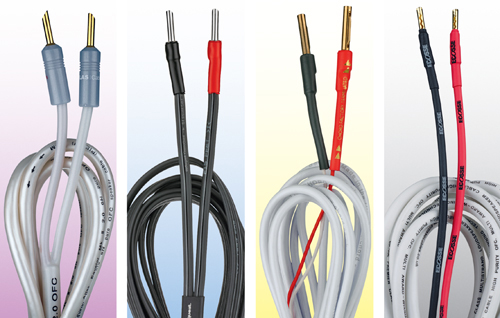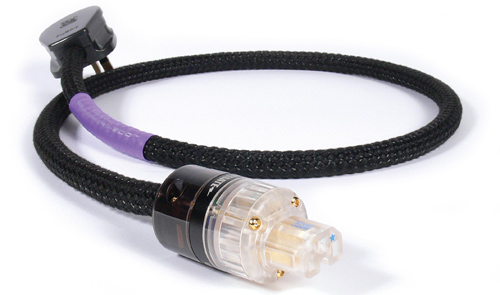The great cable debate – crossed wires?

UPDATE 28.03.13:
Wow, where do I start? I wrote this blog just to offer my opinion. I knew that not everyone would share it, which is fine, but I purely saw it as a chance to put my experiences across on what we all know can be a prickly subject.
I'd also like to state that my opinions have absolutely nothing to do with advertising revenue or the cable manufacturers themselves (despite what some people would want to believe). I didn't mention any manufacturers for that very reason.
I've also never claimed that you need to spend a fortune on expensive digital cables. As I said at the beginning, before I joined What Hi-Fi? I would have classed myself as a disbeliever.
Below, I'll do my best to answer some of your subsequent comments and queries on cable testing.
tzip asked about our cable reviewing process. Well, it goes along the lines of:
1- We decide which type of cables we want to round up
Get the What Hi-Fi? Newsletter
The latest hi-fi, home cinema and tech news, reviews, buying advice and deals, direct to your inbox.
2- We call a manufacturer and ask for a certain length of cable, which tends to be around 5m for speaker cable, 1m for interconnects
3- We run all cables overnight if not longer.
4- We set up a couple of different systems where the products used in each system are constant i.e. the source, amplification and speakers
5- We listen in our test rooms, which are used as a tool. They're acoustically treated, so the room has as little impact as possible on how we listen. They sound neutral as opposed to bright or overly damped. This allows us to hear differences more easily when switching between cables.
6- A couple of reviewers do the listening at the same time. We hear the first minute or two of a track and then skip back to the beginning of the same track for around 8-15 seconds. It's at this point where one of the reviewers will swap out one cable for another, before we play the same piece of music. We continue to swap back and forth before we introduce another new cable. We continue this process until all the cables have been listened to, revisiting where we believe necessary.
7- We've experimented with blind testing over the years but it's not part of our standard review process for any products.
8- We don't take measurements and never have done. Most of our readers just aren't that interested in them. In our experience, there isn't necessarily a direct correlation between measurements and sound quality.
sweethom makes a valid point that it's the telephone number prices some people are asking for these interconnects, that are off-putting to the average punter. Don't get me wrong, I've reviewed cables that haven't offered great value for money - you don't always have to buy expensive cables to make a difference. But this is down to opinions on how music is allowed to sound through the cable.
BretM brought up the subject of hard disks, and whether they could make a difference. In my opinion I see no reason as to why there couldn't be differences between NAS devices and hard drives in the way they sound.
Callingrigore and other contributors mentioned ethernet cables and I understand what's being said. But, I've recently been part of a listening session where, in my opinion, I heard differences between such cables, so I can't really agree.
MakkaPakka asked about the possibility of opening up our tests to readers, a reasonable enough request. Back in July 2010 we invited three readers to come down and take part in our Big Question feature, entitled "Can changing an HDMI cable make a difference to your AV kit?" This was done blind: we didn't tell the guys which component we were changing (the HDMI cable) until the end. The conclusion reached was that the readers did admit to seeing and hearing differences. Who's to say we won't be able to do similar events in future.
Original article published 26.03.13:
I have a confession to make. I wasn’t born an audiophile. When I first started working on What Hi-Fi? I’d just finished at University and wanted to get into journalism. And, being in to films and music, consumer electronics seemed as good a place to start as any.
Could I tell my Arcam from my elbow? No, but having worked on the magazine and website for the best part of a decade I like to think my knowledge and experience has amounted to something.
Did I think cables could make a difference when I first started out? No. In fact, the thought had never really crossed my mind. Heck, if a member of the editorial team had suggested you could hear a difference between a poor quality and good quality ethernet cable I’d have suggested they trot off to a darkened room and have a harsh word with themselves.
Alas, I’m sorry to report that in my experience ethernet cables (yes, really) together with mains, HDMI and speaker cables, can make a difference. I’ve heard it with my own ears.
Granted the differences can vary. You don’t have to spend a lot to hear an improvement, and by the same token, you could spend quite a lot and not really hear enough of an improvement to justify the cost, if at all. I’ve rounded up groups of similar cables at similar prices and in my opinion there have been clear (and some not so clear) differences between them.
I’m not going to sit here and recommend someone with a £1500 hi-fi system go and spend £750 on a pair of analogue interconnects and £600 on a couple of lengths of speaker cable. But if their system was more like £15,000 then that would be a completely different matter.

We feel so strongly about this that we continue to give Awards to cables. That’s despite having to defend ourselves continually from a barrage of non-believers, taking aim at anyone who’s got an opinion contrary to theirs. They’re all too happy to gang up with like-minded thinkers who have little or no experience of actually listening to products in a controlled environment.
Now I’m not going to waste your time talking technical. You can put whatever research you want in front of me, all the measurements in the world aren’t going to stop me from having the opinion that all digital cables do not sound the same. There, I said it.
I don’t know why they sound different – speak to a few of the big cable manufacturers and heck, they’ll tell you that even they don’t know. They have theories, but that’s all. Does this lack of scientific proof mean that there aren’t differences? I don’t think so, but it’s this lack of knowledge that makes life difficult for us and the industry as a whole.
The fact we can’t scientifically prove beyond a shadow of a doubt why we can hear and see differences is seen as an “in” to start throwing accusations around.
I’m a reviewer, not a physicist, nor an engineer. I report back my findings, what I see and hear, so people can make an informed decision before they buy something.
So feel free to tell me I don’t know what I’m talking about, that I’m on the take and that cable manufacturers must be paying to keep me in fizzy pop and pizza. I won’t reply.
I don’t mind engaging in mature discussions, but when it comes to cables, the ability to have a civil conversation with some people goes out of the window. I’m paid to help advise people how to get the best from their system and, shock, horror, I’m afraid that includes recommending cables…
MORE: Awards 2013: Accessories and cables
by Andy Madden
Andy is Deputy Editor of What Hi-Fi? and a consumer electronics journalist with nearly 20 years of experience writing news, reviews and features. Over the years he's also contributed to a number of other outlets, including The Sunday Times, the BBC, Stuff, and BA High Life Magazine. Premium wireless earbuds are his passion but he's also keen on car tech and in-car audio systems and can often be found cruising the countryside testing the latest set-ups. In his spare time Andy is a keen golfer and gamer.

